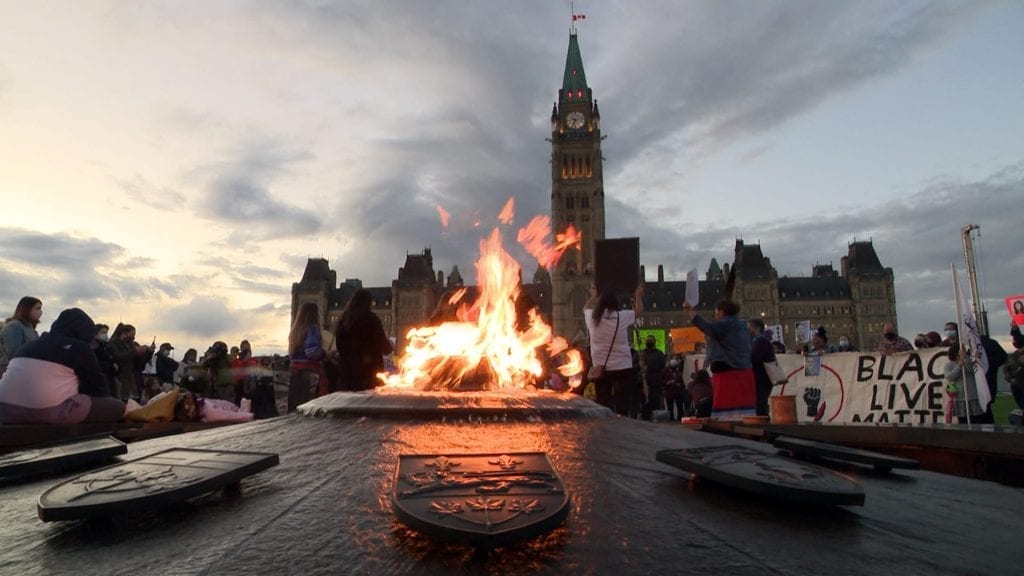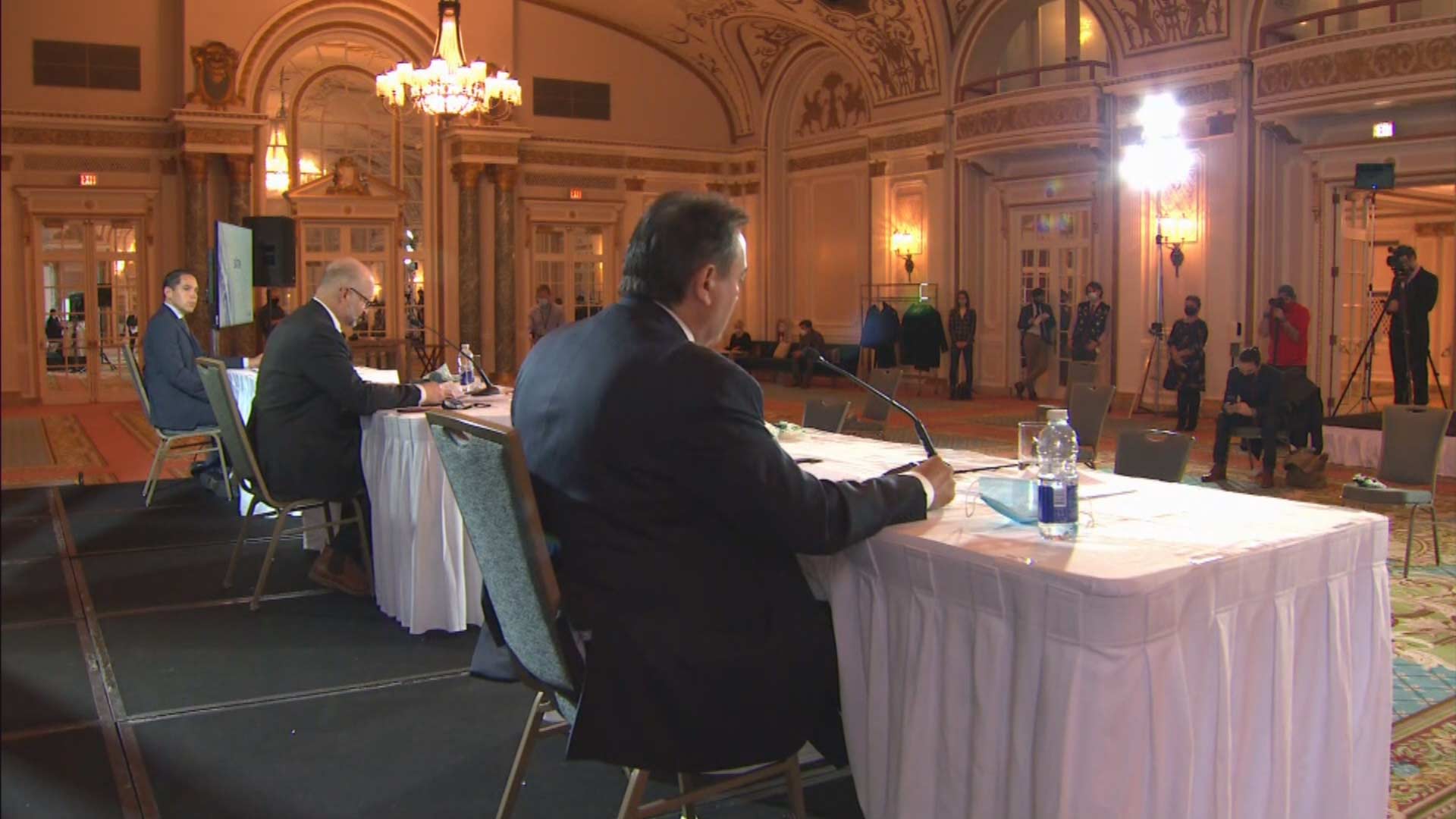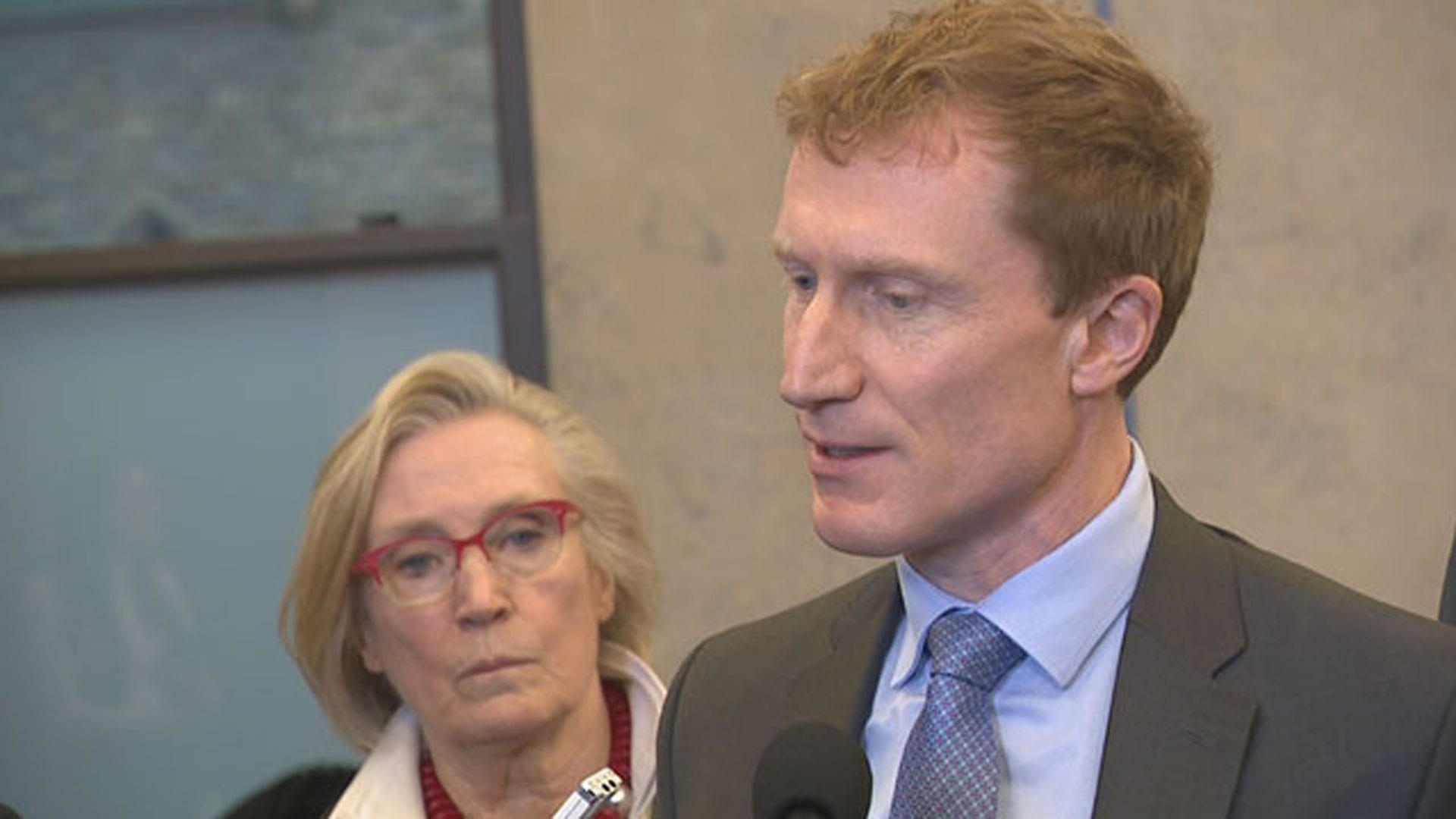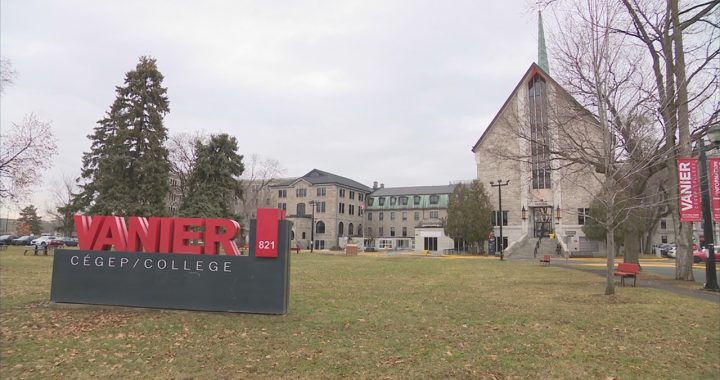
Parliament Hill during a justice for Joyce Echaquan protest. Systemic racism came up several times at the AFN general assembly. Photo: APTN/File
The man in charge of federal policing, prisons and parole in Canada says he’s working on significant systemic reforms to address the “grossly inappropriate” and “scandalous” racism Indigenous people face in the institutions he’s responsible for.
“The numbers, in my opinion, are scandalous, outrageous and tragic when we see the terrible misrepresentation of Indigenous people in the criminal justice system, incarcerated in our prisons,” Public Safety Minister Bill Blair told First Nations chiefs Tuesday night.
“We’re going to have to do reform within the prison system. But it’s the courts that sent them there, so we’ll have to reform in the courts. It’s the police that took them to court, so there’s reforms in the police (needed).”
Blair said he asked for money in the spring budget to make the First Nations policing program an essential service through new legislation. He told the chiefs during the Assembly of First Nations (AFN) general assembly that Ottawa is giving their organization $1.5 million as “seed money” to kick off the dialogue process.
“We have a responsibility, in my opinion, to make the systemic and structural changes that removes the racist disparity that’s creating terrible outcomes for Indigenous people,” said Blair.
He and four other federal cabinet ministers fielded questions from the AFN delegates during a session that ran into the evening. The prime minister spoke earlier.

Chiefs seized the opportunity to ask questions directly to the country’s most powerful policy-makers. They asked about everything from treaties, land claims, critical infrastructure and Canada’s historical colonial policies.
“When will the Indian Act doctrine of terra nullius and discovery be abolished?” one chief, through the moderator, asked Justice Minister David Lametti. “Treaties were made in bad faith, and Canada should come to the table with clean hands.”
In the early days of contact, European imperial powers used these two largely discredited notions to justify dispossessing Indigenous nations of lands and resources.
Terra nullius is Latin for empty land. It refers to the notion, discredited by Canada’s highest court several times, that First Nations didn’t own or weren’t sovereign over their traditional territories.
“They are bunk,” Lametti said. “They don’t represent reality and they didn’t represent the reality at the time, and I am sincere in those comments.”
When pressed again on the subject, Lametti pointed to the government-sponsored bill that would help align federal laws with the United Nations Declaration on the Rights of Indigenous Peoples (UNDRIP) if passed.
“When we talk about the Indian Act, when we talk about doctrines of terra nullius and discovery and wanting to overturn them or change them or get out from underneath them, I think the declaration is a good step in that declaration.”

The chiefs also grilled Crown-Indigenous Relations Minister Carolyn Bennett on land claims.
“The chiefs across Canada and many First Nation elders and knowledge keepers have done their homework, their research. They’re ready to settle these comprehensive claims, these land claims, these spec claims,” said Bobby Cameron, chief of the Federation of Sovereign Indigenous Nations in Saskatchewan.
“Sign on the dotted line,” he urged, “and let’s start improving the quality of life for our First Nations right across Canada. Sign on the dotted line.”
On Tuesday, neither Prime Minister Justin Trudeau nor National Chief Perry Bellegarde raised the issue of the protests, land occupations and blockades that took place across the country in 2020 and remain unresolved. Those on the front lines often cite unresolved land issues.
“I’m excited by the progress that we’re making on comprehensive claims and the path to self-determination,” Bennett replied. “I need to be clear with this assembly that everything I do is to help people get out from under the Indian Act.”
She said the government has established negotiating tables on governance with “over half of the Indian Act bands” in the country but didn’t directly answer Cameron’s call for Ottawa to quickly move the needle on land issues.
Wiikwemkoong Ogimaa Duke Peltier and Muskowekwan Chief Reginald Bellerose also pushed Bennett to reform the cumbersome and time-consuming specific claims process.
Specific claims are land claims based on unfulfilled or broken treaties and still require “extinguishment and surrender” prior to resolution, Peltier said.
“When there’s a historical surrender that’s alleged to be invalid, then the new surrender traditionally has been part of the resolution process and then compensation,” Bennett said.
“But we’re really open to having discussion around alternatives to that word surrender. We’ve eliminated it in all the comprehensive claims and certainly in the negotiations to self-determination. Cede and surrender, extinguishment, those are gone. But on the specific claims those are the kinds of reforms we’re looking towards.”

Trudeau and Bellegarde noted that lack of clean water, adequate housing and critical infrastructure on reserves put First Nations at far greater risk from the COVID-19 pandemic.
Coldwater Indian Band Chief Lee Spahan, whose community applied to the Supreme Court of Canada to protect their aquifer from the Trans Mountain pipeline expansion, raised the issue again.
“The Trans Mountain pipeline runs through our community making profits and benefitting the Canadian economy as a whole. Meanwhile, the basic needs of my community are unaddressed,” he said.
Spahan told Indigenous Services Minister Marc Miller that there is an elder in the community whose well, which relies on the river, ran dry.
“The Coldwater River is one of the most endangered rivers in British Columbia. Our backup system is our firetruck, and that’s what we have to use to deliver water to that elder whose well went dry,” he said. “How is Canada going to respond to reconciliation about issues like that?”
Miller replied that Ottawa remains committed to providing clean water, even though they’ll miss their March 2021 deadline to end long-term drinking water advisories.
“Closing that infrastructure obviously is key, but also resolving all the issues in and around land, which is such an asset, in a more expedient fashion,” he said. “These are all discussions that have been brought to the fore and become more acute during COVID.”
Miller also discussed the government’s Indigenous child welfare reform law, former Bill C-92. He reiterated that the Liberals are committed to paying children harmed by the underfunded child welfare system on reserves in the Yukon.
“No child should be deprived of their community, their culture or their loved ones and we recognize that Indigenous communities are best placed to make the decisions over their children and their families.”
The chiefs are slated to discuss UNDRIP, specific claims, rights and justice, and environmental issues through Wednesday afternoon.










